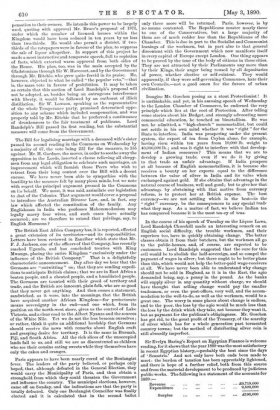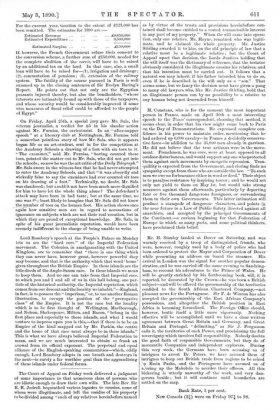Sir Evelyn Baring's Report on Egyptian Finance is welcome reading,
for it shows that the year 1889 was the most satisfactory in recent Egyptian history,—probably the best since the days of Sesostris.' And not only have both ends been made to meet : the burden of taxation has been appreciably lightened, and there is hope of a further relief, both from this source and from the material development to be produced by judicious public works. The following is a statement of the accounts for 1889 :—
Revenue ... ....99,719,000 Expenditure • .. ... 9,523,000
Surplus ... .., ... £196,000 Estimated Revenue ... ... £9,650,000 Estimated Expenditure ...
Estimated Surplus ... £150,000 If, however, the French Government refuse their consent to the conversion scheme, a further sum of £150,000, needed for the complete abolition of the earvee, will have to be raised by an additional tax on the land. In that case, also, a small loan will have to be raised for—(1), irrigation and drainage ; (2), commutation of pensions ; (3), extension of the railway system. The futility of the course pursued in Paris is well summed up in the closing sentences of Sir Evelyn Baring's Report. He points out that not only are the Egyptian peasants injured thereby, but also the bondholders, " whose interests are intimately bound up with those of the taxpayers, and whose security would be considerably improved if some wise measures of fiscal relief could be afforded to the people of Egypt."







































 Previous page
Previous page